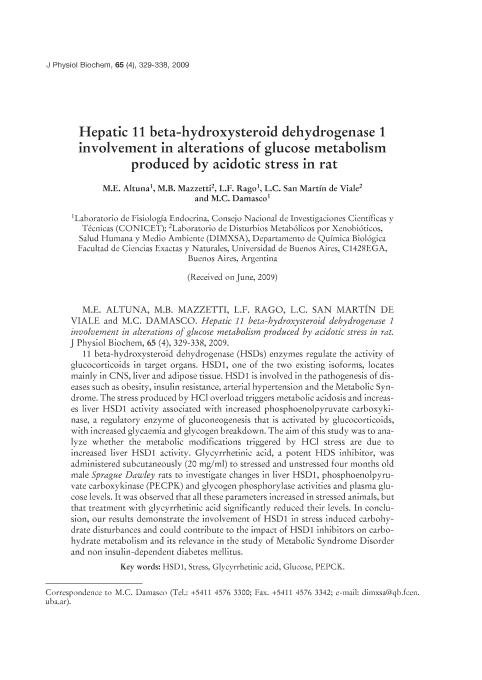Artículo
Hepatic 11 beta-hydroxysteroid dehydrogenase 1 involvement in alterations of glucose metabolism produced by acidotic stress in rat
Altuna, Maria Eugenia ; Mazzetti, Marta Blanca; Rago Ferrón, Luciana; San Martín De Viale, L. C.; Damasco, Maria Cristina
; Mazzetti, Marta Blanca; Rago Ferrón, Luciana; San Martín De Viale, L. C.; Damasco, Maria Cristina
 ; Mazzetti, Marta Blanca; Rago Ferrón, Luciana; San Martín De Viale, L. C.; Damasco, Maria Cristina
; Mazzetti, Marta Blanca; Rago Ferrón, Luciana; San Martín De Viale, L. C.; Damasco, Maria Cristina
Fecha de publicación:
12/2009
Editorial:
Servicio Publicaciones Universidad Navarra
Revista:
Journal of Physiology and Biochemistry
ISSN:
1138-7548
Idioma:
Inglés
Tipo de recurso:
Artículo publicado
Clasificación temática:
Resumen
11 beta-hydroxysteroid dehydrogenase (HSDs) enzymes regulate the activity of glucocorticoids in target organs. HSD1, one of the two existing isoforms, locates mainly in CNS, liver and adipose tissue. HSD1 is involved in the pathogenesis of diseases such as obesity, insulin resistance, arterial hypertension and the Metabolic Syndrome. The stress produced by HC1 overload triggers metabolic acidosis and increases liver HSD1 activity associated with increased phosphoenolpyruvate carboxykinase, a regulatory enzyme of gluconeogenesis that is activated by glucocorticoids, with increased glycaemia and glycogen breakdown. The aim of this study was to analyze whether the metabolic modifications triggered by HC1 stress are due to increased liver HSD1 activity. Glycyrrhetinic acid, a potent HDS inhibitor, was administered subcutaneously (20 mg/ml) to stressed and unstressed four months old male Sprague Dawley rats to investigate changes in liver HSD1, phosphoenolpyruvate carboxykinase (PECPK) and glycogen phosphorylase activities and plasma glucose levels. It was observed that all these parameters increased in stressed animals, but that treatment with glycyrrhetinic acid significantly reduced their levels. In conclusion, our results demonstrate the involvement of HSD1 in stress induced carbohydrate disturbances and could contribute to the impact of HSD1 inhibitors on carbohydrate metabolism and its relevance in the study of Metabolic Syndrome Disorder and non insulin-dependent diabetes mellitus.
Palabras clave:
Glucose
,
Glycyrrhetinic Acid
,
Hsd1
,
Pepck
,
Stress
Archivos asociados
Licencia
Identificadores
Colecciones
Articulos(IQUIBICEN)
Articulos de INSTITUTO DE QUIMICA BIOLOGICA DE LA FACULTAD DE CS. EXACTAS Y NATURALES
Articulos de INSTITUTO DE QUIMICA BIOLOGICA DE LA FACULTAD DE CS. EXACTAS Y NATURALES
Citación
Altuna, Maria Eugenia; Mazzetti, Marta Blanca; Rago Ferrón, Luciana; San Martín De Viale, L. C.; Damasco, Maria Cristina; Hepatic 11 beta-hydroxysteroid dehydrogenase 1 involvement in alterations of glucose metabolism produced by acidotic stress in rat; Servicio Publicaciones Universidad Navarra; Journal of Physiology and Biochemistry; 65; 4; 12-2009; 329-337
Compartir
Altmétricas



